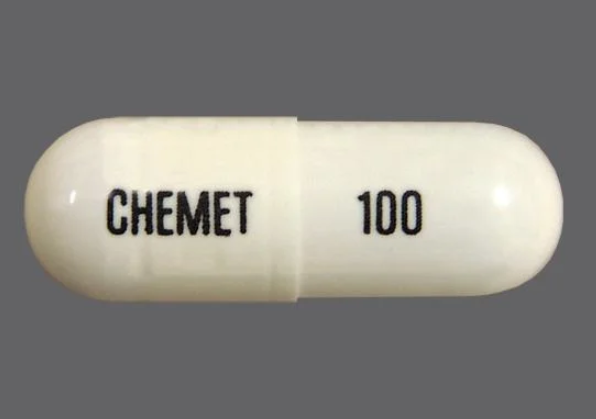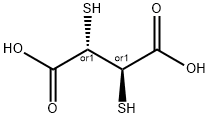What is the drug Succimer?
Introduction
Succimer, a water-soluble analog of dimercaprol, is the meso isomer of 2,3-dimethylmercaptosuccinic acid (DMSA). CHEMET (succimer) is an orally active, heavy metal chelating agent. Succimer is a white crystalline powder with an unpleasant, characteristic mercaptan odour and taste. Each CHEMET opaque white capsule for oral administration contains beads coated with 100 mg of succimer and is imprinted black with CHEMET 100. Inactive ingredients in medicated beads are povidone, sodium starch glycolate, starch and sucrose. Inactive ingredients in the capsule are gelatin, iron oxide, titanium dioxide and other ingredients[1].

Uses
Succimer is a lead chelator for oral administration and has also been used to treat mercury poisoning, albeit with limited efficacy. Succimer combines with lead in the blood stream. The combination of lead and succimer is then removed from the body by the kidneys. It has a wider therapeutic index than dimercaprol and edetate calcium disodium (CaNa2EDTA); hence, it is recommended by the AAP for initial management of children with blood levels greater than 45 μg/dL and less than 70 μg/dL. It can rapidly decrease lead levels and replete sulfhydryl-dependent enzymes. Studies have shown that despite being able to lower blood lead concentrations, succimer does not reverse or diminish the cognitive impairment or other behavioral or neuropsychologic effects of lead in children with lower lead levels; hence, it is not recommended for levels less than 45 μg/dL[2].
Side effects
The most common adverse effects are abdominal distress, transient rash, elevated hepatocellular enzyme levels, and neutropenia. Nausea, vomiting, diarrhea, and anorexia are common. Rashes, sometimes necessitating withdrawal, have been reported in up to 10% of adults and 5% of children, and mild transient rises in serum aminotransferase activity in 6–10% (mostly adults). Life-threatening hyperthermia occurred on two occasions in one subject, but no details were given. Iron can be safely and effectively given to patients taking succimer, which (unlike dimercaprol) does not appear to deplete iron stores or to form a toxic chelate that would preclude the parenteral administration of iron.
Pregnancy
Succimer is teratogenic and fetotoxic in pregnant mice when given subcutaneously in a dose range of 410 to 1640 mg/kg/day during the period of organogenesis; in a developmental study in rats, succimer produced maternal toxicity and deaths at the dose of 720 mg/kg/day or more during organogenesis. The dose of 510 mg/kg/day was the highest tolerable in pregnant rats; impaired development of reflexes was noted in pups of 720 mg/kg/day group dam; there are no adequate and well-controlled studies in pregnant women.
References
[1]label (fda.gov) https://www.accessdata.fda.gov/drugsatfda_docs/label/2018/019998s021lbl.pdf
[2] Succimer - an overview | ScienceDirect Topics https://www.sciencedirect.com/topics/medicine-and-dentistry/succimer
);You may like
Related articles And Qustion
Lastest Price from Succimer manufacturers

US $0.00/Kg/Bag2024-09-19
- CAS:
- 304-55-2
- Min. Order:
- 2Kg/Bag
- Purity:
- 98% up / CP2015
- Supply Ability:
- 20 tons

US $0.00/Kg/Bag2024-09-18
- CAS:
- 304-55-2
- Min. Order:
- 1KG
- Purity:
- 99.0%~101.0%
- Supply Ability:
- 500kg/month



